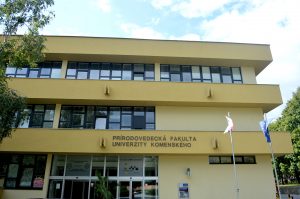
Research at the department focuses on the study of bacteria, yeasts and viruses.
Various aspects of microbial community life (biofilm), such as communication, adaptation to adverse conditions, immunomodulatory properties of surface antigens and their role in adherence to living and non-living surfaces are investigated. Another research area is devoted to characterization of newly developed nanomaterials and their antimicrobial properties by means of modern physicochemical approaches as well as molecular biological methods and modelling. Particular attention is paid to research deciphering the mechanisms of photodynamic inactivation and its usability in the prevention and eradication of antimicrobial-resistant microbial biofilms.
In yeast research, implementation of various molecular genetic methods helps to unravel the molecular mechanisms responsible for (i) the development of resistance to antifungal therapeutics in pathogenic and non-pathogenic yeast species and (ii) the possibility of overcoming this undesirable phenomenon through the use of plant derivatives.
Research in the field of herpesviruses has focused on the study of bioactive growth factor-like compounds with antiproliferative and immunomodulatory properties, isolated from the MHV-68 strain. Currently, research is also focused on investigating the effects of drugs from the group of glycosaminoglycans and sulphated heteropolysaccharides under in vitro and in vivo conditions.
Influenza virus research is focused on the study of the spread of low and highly pathogenic influenza viruses in the brain, heart and spleen of infected mice. The aim is to find out what immune responses occur in murine host, with emphasis on the NS1 protein and its effects on cytokine profiles in the organs of infected mice, and what role the immune cells play in the pathogenesis of the influenza virus.
Research of the tick Ixodes ricinus microbiome is mainly focused on two pathogens found in Slovakia, the tick-borne encephalitis virus and the spirochete Borrelia burgdorferi. The aim of the research is to obtain missing data on the interactions of the pathogens with the tick microbiome and to investigate a pathogen transmission and the activation of the tick immune pathways in the polymicrobial environment of the tick.
Significant attention has also been paid to the study of the human microbiome in healthy populations and in patients with non-communicable diseases. The aim of the research is to profile and identify dysbiotic patterns and important disease-associated microorganisms and to investigate the interaction of the microbiome with the host using molecular and bioinformatic approaches.
